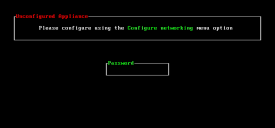Insight powered by AppSense
Install and Start the Appliance
In this section:
Appliance Prerequisites
The appliance runs on a hypervisor or virtual machine server in the enterprise demilitarized zone (DMZ). From there the appliance provides secure communications using Secure Socket Layer (SSL) encryption.
Hardware and Hypervisor
Ivanti provides separate media for the following hypervisors:
- VMware ESXi versions 5.5 to 6.0
- Hyper-V 2012 R2 and later
Each virtual appliance requires a minimum of 4GB RAM and 4vCPUs.
For environments with over 4,000 users, it is recommended that your appliance has a minimum of 8 cores and 16GB of ram.
For information about setting the upload frequency, see Settings.
Supported Operating Systems and Technologies
The supported operating systems and technologies are detailed in the Maintained Platform Matrix.
DNS Settings
Insight requires internal DNS settings and a public DNS record. The appliance DNS settings must specify the DNS servers in the Active Directory and the domain names it should search.
To access the Insight service on the Internet, you must set up a public DNS record using the Insight server name. You can then use this public DNS name to generate the Certificate Signing Request (CSR) and apply for a publicly trusted SSL certificate.
Ports
Configure the following IP ports:
| Port | Description |
|---|---|
| TCP 443 | The web administration interface is available over SSL on http port 443. Clients can also use this port but it is recommended that they connect to port 10443 so client traffic is segregated from the web administration interface. |
| TCP 10443 | For optimum performance clients should connect to port 10443. |
| TCP 80 | Reserved for future use. |
| UDP 53 | Domain Name System (DNS) on UDP 53. |
Checklist of Required Information
To complete the installation and configuration of the Insight appliance you require the following information.
| Hypervisor | Details |
|---|---|
| Hypervisor | VMware ESXi or Hyper-V |
| Insight Network | Details |
|---|---|
| Insight Appliance Name | <appliance name> |
| Appliance IP address | <IP address> |
| Subnet mask | <IP mask> |
| Gateway | <gateway IP> |
| DNS | Details |
|---|---|
| DNS servers | <IP addresses> |
| DNS search domains | <domain names> |
Install the Appliance
To install the Insight Appliance, the template must be imported into a hypervisor or virtual machine.
Install the Appliance on ESXi using vSphere Client
When deployed to ESXi, the OVF template defaults networking to "Host Only" and must be manually assigned the correct network before using the appliance
- Download and extract the Insight ESXi zip on your local machine.
- Start the VMware vSphere Client and log in to the host of vCenter Server.
- From the menu, select File > Deploy OVF Template and follow the wizard.
Start the Appliance and Change the Password
When you are deploying the appliance, connectivity can be lost when the appliance is migrated to another node, for example, following a reboot. Network configurations are not be applied because dynamic MAC addresses assigned in Hyper-V are lost when the node is moved. To solve this issue, configure a static MAC address in Hyper-V. You must do this prior to booting the appliance for the first time.
- Start or power on the virtual machine and wait for the appliance to boot.
-
Press F2 to display the password prompt and enter the default password: AppSense
- The Main Menu displays. You must change your password before you can configure networking.
-
Select Change Password and press Enter.
The password prompt displays.
-
Type the default password, AppSense, and press Enter.
-
Type the new password and press Enter.
-
Type the new password again to verify it and press Enter.
The Main Menu displays with the Configure networking option now available.
The appliance password cannot be recovered or reset, so make sure you remember it, or store it securely
Was this article useful?
The topic was:
Inaccurate
Incomplete
Not what I expected
Other
Copyright © 2017, Ivanti. All rights reserved.
